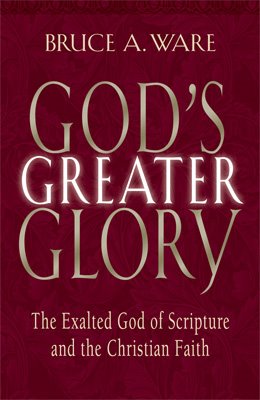
Ware, Bruce A. God's Greater Glory. Wheaton, IL: Crossway, 2004. 256 pp. $17.99.
This is by far one of the best books I've ever read.
In many ways, it helps bring a great degree of resolution to one of my theological struggles. For years, I struggled to make sense of the apparently paradoxical concepts of God's sovereignty and human responsibility, the glory of God and the problem of evil, and the relation of God's love for man to God's love for Himself. I was enthralled for a time with a pseudo-Erasmianism, then I shifted and hesitantly entertained Luther's strong determinism. I finally came to appreciate the subtleties of Jonathan Edwards' concept of "free will," namely that our will is free as long as it is able to act on its strongest inclination. Consequently, a fallen human nature of an unsaved person will never desire the glory of God and will never be able to seek God's grace apart from the influence of the Holy Spirit. But Dr. Ware has taken all the best of Edwards' massive theology and contemporized it into an easily readable book.
He is fundamentally concerned with advocating a biblical doctrine of God, not with defending a certain tradition or rebuking an opponent. Ware, a proud Reformed Calvinist (4 points, at least), is all about the exhaustive sovereignty of God. But he is not insensitive to concerns about how to explain the problem of evil or human responsibility. Ware actually believes in free will, but he defines it carefully and biblically as "freedom of inclination" and shows how human beings make decisions based on what they most want to do in a given situation. The sovereign God of Scripture knows what every person will desire in a given set of circumstances, and is able to structure His sovereign, perfect plan through meticulously ordaining the specific circumstances that result in a human agent choosing "freely" given his or her strongest inclination at the time of decision.
In our materialistic choice-driven, hedonistic culture, Ware is able to demonstrate that for all our assumptions about freedom, we will always be bound to our own greatest inclination. Ultimately, Ware stakes his doctrinal case upon a rock-solid biblical foundation. His analysis of Joseph’s rise to power in Egypt is a convincing argument for compatibilist freedom, as are his references to God’s employment of the military conquests of nations such as Assyria in Isaiah 10 in order to accomplish His sovereign will.
In my opinion, Ware’s explanation of how God uses evil men’s free will to accomplish His own purpose is a considerably more helpful articulation of man’s total depravity and God’s divine sovereignty than even Martin Luther’s infamous horse and rider analogy, which implied that human agents are unthinking puppets in the service of greater powers. While Ware is clearly convinced that nothing escapes the knowledge of God and nothing can frustrate the purposes of God, he is comfortable enough to affirm that the choices humans make are indeed real choices. Human beings are certainly responsible for their own choices because they always relent to their greatest inclination, and God cannot be blamed for permitting anyone to choose as they most desire. Yet, in the spirit of John Piper’s Christian hedonism, Ware also makes it clear that only God can transform our depraved minds so that His glory becomes our greatest delight.
God’s Greater Glory succeeds partly because it presents logical and biblical answers to age old questions of predestination and free will. Because of Ware’s sensitivity to the problem of evil and human moral responsibility, this book should even be appreciated by non-Calvinists with a high view of God and Scripture. He explains and defends the Reformed tradition well but is not afraid to employ new terminology to describe old ideas. Yet, in spite of all Ware’s sensitivity to human arguments, this book is primarily concerned with promoting an exalted view of the God of the Bible and the historic Christian faith. This book is more than simply a response to evangelicalism’s problem of Open Theism. It is a product of a man whose faith is founded upon a glorious and sovereign God. Ware speaks prophetically to our generation by calling Christians back to a God-centered theology and promises that our joy will be well-founded once our vision of God is conformed in accordance with Scripture.
Buy it. Read it. Praise the Lord God. And thank me later.